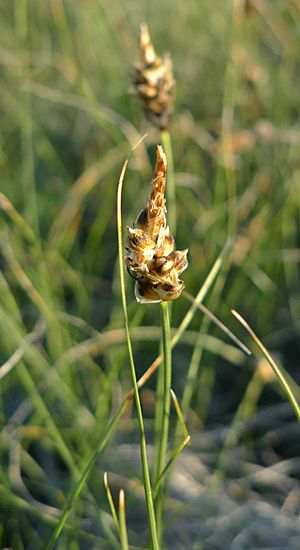Threadleaf sedge facts for kids
Quick facts for kids Threadleaf sedge |
|
|---|---|
 |
|
| Carex filifolia on Badger Mountain, Douglas County Washington | |
| Scientific classification | |
| Kingdom: | |
| (unranked): | |
| (unranked): | |
| (unranked): | |
| Order: | |
| Family: | |
| Genus: | |
| Species: |
C. filifolia
|
| Binomial name | |
| Carex filifolia Nutt.
|
|
| Synonyms | |
|
Carex elyniformis |
|
Carex filifolia is a type of plant called a sedge. Its common name is threadleaf sedge because its leaves look like thin threads. Sedges are grass-like plants that often grow in wet places.
Contents
Where It Grows
This sedge naturally grows in many parts of western North America. You can find it from Alaska down to California. It also grows from Manitoba in Canada to New Mexico in the United States. It is a tough plant that can live in both wet and dry areas.
What It Looks Like
Carex filifolia grows in clumps. Its stems can be round or triangular. They are thin and strong, like wire. These stems can grow up to about 35 centimeters tall.
Roots and Leaves
This plant has many roots that spread out. These roots help it form a thick mat on the ground, which is called sod. The leaves are very narrow. They are tightly rolled up, making them look like the end of a feather or a quill.
Flowers and Fruits
The plant's flowers grow in a cluster up to 3 centimeters long. This cluster is called an inflorescence. The flowers have reddish scales covering them.
After the flowers, the plant produces fruit. Each fruit is inside a small, somewhat hairy sac. This sac is called a perigynium. Carex filifolia does make some seeds. However, it mostly makes new plants in another way.
How It Reproduces
Carex filifolia mainly makes new plants using a method called vegetative reproduction. This means it grows new plants from its stems or roots, instead of mostly from seeds. This helps it spread and form large patches of sod.
See also
 In Spanish: Carex filifolia para niños
In Spanish: Carex filifolia para niños

